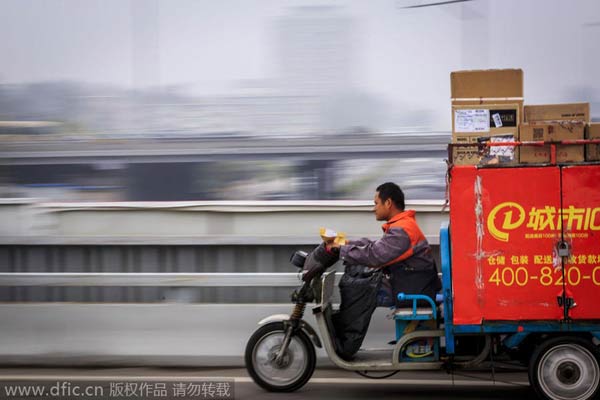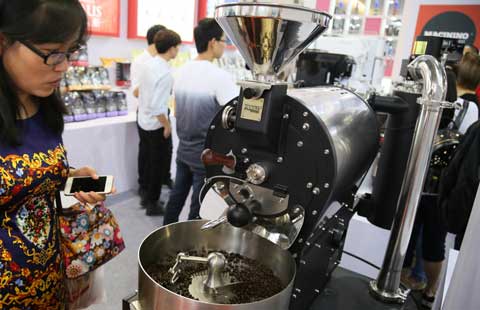Robots to be game changers in express delivery sector
By He Yini (chinadaily.com.cn) Updated: 2016-07-11 17:45
 |
|
A courier en route to deliver packages in Beiing, Oct 11, 2014. [Photo/IC] |
Imagine a world rife with robots that could make everything in daily lives easier, faster and more cost-effective.
In the express delivery industry, for instance, robotic operations are starting to claim a foothold in warehouses, distribution centers and even in deliveries.
China's logistics industry, driven by the explosive e-commerce growth over the past decade, entails immediate smart transition, said Zhang Yong, Alibaba's chief executive and chairman of Cainiao, at a recent industry summit.
"This will in turn bolster sustained development of the e-commerce sector in the future," he said.
Intelligent robots could largely cut cost of the logistics industry, which is key to new businesses and new economy, Zhang said previously.
Statistics show the number of parcels delivered daily in the country has reached 60 million, with a compound annual growth rate of 30 percent over the past decade. In the meantime, however, labor cost accounts for more than 40 percent of the total cost for the industry.
Alibaba's logistics arm Cainiao, formally named Zhejiang Cainiao Supply Chain Management Co, said its E.T Logistic Lab was expected to roll out China's first crew of robotic deliverymen by the end of the year in residential communities, industrial parks and office buildings.
According to the company, these robots can come up with the best routes to deliver packages into the hands of customers after picking up the goods at a nearby distribution center.
What makes it even more fascinating is that they will also be able to take elevators by themselves, avoid barriers and navigate themselves inside buildings.
It's believed robots will be the next big thing in the industry. According to CI Consulting, the value of the intelligent logistics market is expected to exceed 100 billion yuan by 2020 in China, with an annual growth rate of more than 15 percent.
Allan Martinson, the chief operating officer of the London-based Starship Technologies, told China Business News the company had been trialing its self-driving robotic delivery method in 12 countries and was teaming up with the UK's Just Eat to deliver food ordered online.
These robots are able to travel at 4 miles (about 6.44 km) per hour, carrying as much as 20 pounds (about 9 kg), according to Startup.
Robotic delivery is a pioneering trial, and the future of the express delivery industry, the company said.
New technologies are only significant when they can actually facilitate our daily lives, Just Eat chief executive David Buttres told the newspaper.
- Content businesses emerging as a 'showcase for growth' in the region
- Fintech helps China's internet giants draw their financial roadmaps
- China biggest alumina producer's profit hits 5-year high
- Online shopping complaints rise 87%
- Shanghai G20 meeting vitally important for New Zealand trade: Minister
- China auto sales up 14.6% in June
- A taste of coffee at exhibition in Beijing
- China's mobile manufacturers quickly catching up with big names


















